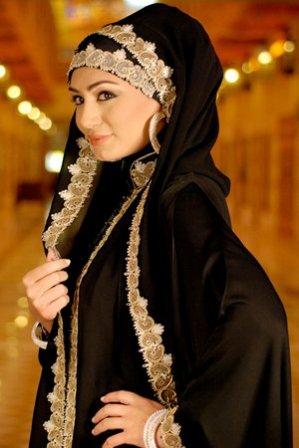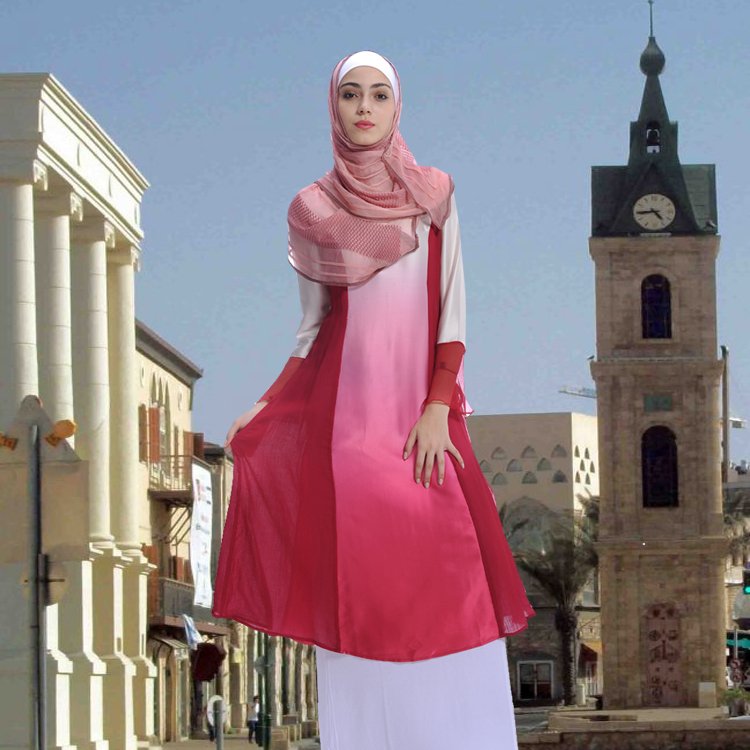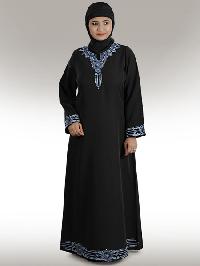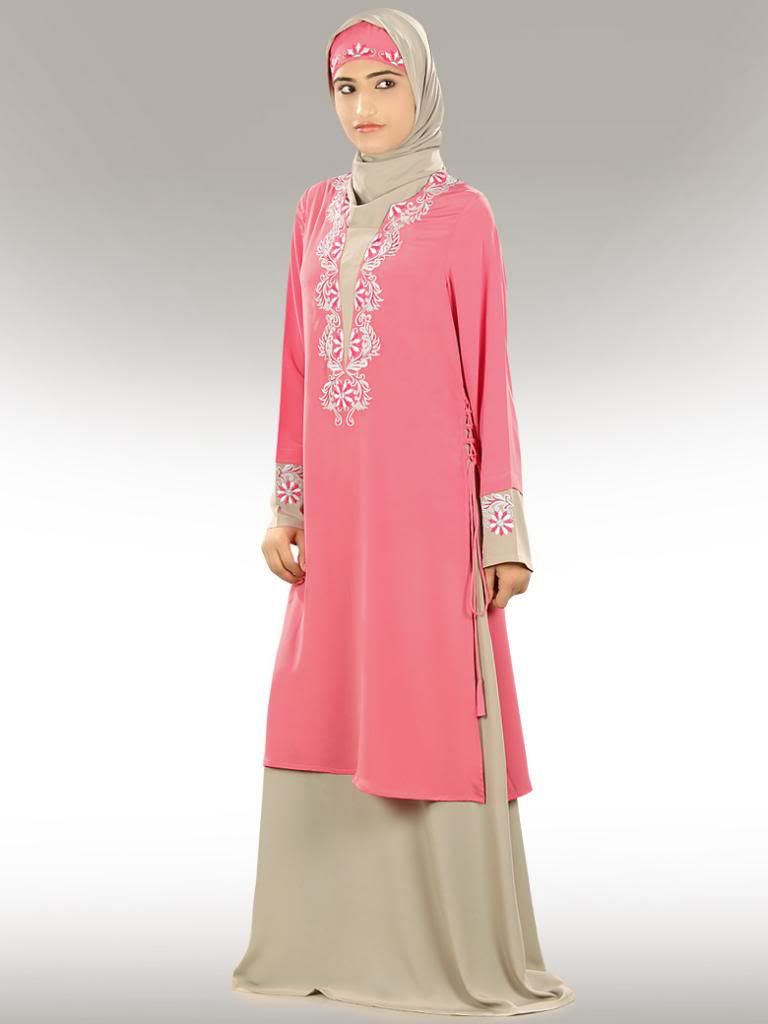About Muslim Women Clothing
Source (google.com.pk)
Before presenting the Quranic rules for women's dress, it is essential to be reminded of the following:
1- The Quran is the only source of law that is authorised by God (6:114).
2- The Quran is complete and fully detailed (6:38, 6:114, 6:89 and 12:111).
3- God calls on His true believers to make sure not to fall in the trap of idol worship by following the words of the scholars instead of the words of God (9:31).
4- God calls those who prohibit what He did not prohibit, aggressors, liars and idol worshippers (5:87, 6:140, 7:32, 10:59).
The command to follow the Quran alone is given very clearly in the Quran, see: Dozen Reasons
Quranic guidelines for women's dress
First Rule : The Best Garment
"O children of Adam, We have brought down to you garments to cover your private parts, as well as for adornment, yet the garment of reverence is the best. These are some of God's signs, perhaps they will remember." 7:26
To revere God and know that He is always watching us is the basic rule for the dress code in the Quran. Any woman knows quite well what is decent and what is revealing. Women do not need to be told, they know how to maintain righteousness and how not to. God created the woman and therefore He knows that she can make this distinction. This is why God set the rule of revering God and maintaining righteousness as the first rule.
Second Rule : Cover your Bosoms
The second rule can be found in 24:31. Here God commands women to cover their bosoms. Before quoting 24:31 let us review some crucial words that are always mentioned in connection to this topic, namely the 'hijab' and the 'khimar'.
The word 'hijab' in the Quran
Hijab is the term used by many Muslim women to describe their head cover. This may or may not include covering their face. The Arabic word 'hijab' can be translated into veil or yashmak. Other meanings for the word 'hijab' include, screen, cover(ing), mantle, curtain, drapes, partition, division, divider.
Can we find the word 'hijab' in the Quran?
The word 'hijab' appears seven times in the Quran. Five of them as 'hijab' and two times as 'hijaban', these are verses: 7:46, 33:53, 38:32, 41:5, 42:51, 17:45 & 19:17.
None of these 'hijab' words are used in the Quran in reference to what the traditional Muslims call today 'hijab', that being the head cover for Muslim woman!
God knows that generations after Muhammed's death the Muslims will use the word 'hijab' to invent a dress code that God Himself never authorised. God used the word 'hijab' ahead of them just as He used the word 'hadith' ahead of them (45:6).
The word 'hijab' in the Quran has nothing to do with the Muslim women's dress code.
Historical Background:
While many Muslims call 'hijab' an Islamic dress code, they in fact oblivious of the fact that the concept of 'hijab' has nothing to do with Islam nor with the Quran.
In fact, the 'hijab' is an old Jewish tradition that infiltrated into the hadith books like many innovations that contaminated Islam through the hadith. Any student of Jewish traditions would know that the head cover for the Jewish woman is encouraged by the Rabbis and religious leaders.
Religious Jewish women still cover their heads most of the time and especially in the synagogues, at weddings and religious festivities. This Jewish tradition is a cultural not a religious one. Hijab was observed by the women of the civilisations that preceded the Jews and was passed down to the Jewish culture.
Some Christian women cover their heads in many religious occasions while the nuns cover their heads all the time. The tradition of covering the head was practiced thousands of years before the Muslim scholars claimed the 'hijab' as a Muslim dress code.
The traditional Arabs, of all religions, Jews, Christians and Muslims used to wear 'hijab' not because of Islam, but because of tradition. In Saudi Arabia for example, all men cover their heads, not because of Islam but because of tradition.
North Africa is known for its Tribe (Tuareg) that have the Muslim men wearing 'hijab' instead of women. Here the tradition has the 'hijab' in reverse. If wearing 'hijab' is the sign of the pious and righteous Muslim woman, Mother Teresa would have been the first woman to be counted.
In brief, 'hijab' is a traditional dress and has nothing to do with Islam or religion. In certain areas of the world, men are the ones who wear the 'hijab' while in others the women do.
Mixing religion with tradition is a form of idol-worship since it implies setting up other sources of religious laws besides the law of God.
The word 'khimar' in the Quran:
The word 'khimar' can be found in the Quran in 24:31 While the first basic rule of Dress Code for the Muslim women can be found in 7:26, the second rule of the dress code for women can be found in 24:31. Some Muslims quote verse 31 of sura 24 as containing the 'hijab', or head cover, by pointing to the word, khomoorihinna, (their khimars), forgetting that God already used the word 'hijab', several times in the Quran. Those who are not shackled by pre-conceptions will easily see that there is no command in 24:31 for women to cover their heads. The word 'khimar' does not mean 'hijab' nor head cover. Those who quote this verse usually add the words (head cover) and (veil) after the word 'khomoorihinna' and usually between brackets. These additions are their own words not the words of God and they are clearly added to the text to imply a meaning not found in God's words. The words of 24:31 are:
"And tell the believing women to lower their gaze and to guard their private parts and not to show their adornments except that of it which normally shows. They shall cover their cleavage with their ‘khimar’. They shall not show their adornments except in the presence of their husbands, their fathers, the fathers of their husbands, their sons, the sons of their husbands, their brothers, the sons of their brothers, the sons of their sisters, other women, their slaves, the male attendants who have no sexual desire and the children who are yet to attain awareness of women’s nakedness. They shall not strike their feet so as to reveal details of their hidden ornaments. You shall repent to God all you believers, so that you may succeed." 24:31
The Arabic word khimar means cover. Any cover can be called a khimar, such as a curtain, a dress. A table cloth that covers the top of a table is a khimar. A blanket can be called a khimar and so on. The word khamr, which is used in the Quran for intoxicants, has the same root as khimar. Both words mean that which covers. The khimar covers a window, a body, a table and so on, while khamr is that which covers the mind. Traditional translators, obviously influenced by Hadith and culture, claim that khimar in 24:31 has only one meaning, and that is veil or hijab. Thus, they mislead women into believing that 24:31 commands them to cover their hair! The correct meaning of the word khimar can easily be verified by consulting any Arabic dictionary.
In 24:31 God is telling women to use their khimar (cover/garment), which could be a dress, a coat, a shawl, a shirt, a blouse, a scarf and so on, to cover their cleavage/bosoms.
Muslim Women Clothing Abaya Designs 2014 Dress Collection Dubai Styles Fashion Pics Photos Images Wallpapers
Muslim Women Clothing Abaya Designs 2014 Dress Collection Dubai Styles Fashion Pics Photos Images Wallpapers

Muslim Women Clothing Abaya Designs 2014 Dress Collection Dubai Styles Fashion Pics Photos Images Wallpapers

Muslim Women Clothing Abaya Designs 2014 Dress Collection Dubai Styles Fashion Pics Photos Images Wallpapers

Muslim Women Clothing Abaya Designs 2014 Dress Collection Dubai Styles Fashion Pics Photos Images Wallpapers

Muslim Women Clothing Abaya Designs 2014 Dress Collection Dubai Styles Fashion Pics Photos Images Wallpapers

Muslim Women Clothing Abaya Designs 2014 Dress Collection Dubai Styles Fashion Pics Photos Images Wallpapers

Muslim Women Clothing Abaya Designs 2014 Dress Collection Dubai Styles Fashion Pics Photos Images Wallpapers

Muslim Women Clothing Abaya Designs 2014 Dress Collection Dubai Styles Fashion Pics Photos Images Wallpapers

Muslim Women Clothing Abaya Designs 2014 Dress Collection Dubai Styles Fashion Pics Photos Images Wallpapers
Muslim Women Clothing Abaya Designs 2014 Dress Collection Dubai Styles Fashion Pics Photos Images Wallpapers
Muslim Women Clothing Abaya Designs 2014 Dress Collection Dubai Styles Fashion Pics Photos Images Wallpapers

Muslim Women Clothing Abaya Designs 2014 Dress Collection Dubai Styles Fashion Pics Photos Images Wallpapers

Muslim Women Clothing Abaya Designs 2014 Dress Collection Dubai Styles Fashion Pics Photos Images Wallpapers

Muslim Women Clothing Abaya Designs 2014 Dress Collection Dubai Styles Fashion Pics Photos Images Wallpapers

Muslim Women Clothing Abaya Designs 2014 Dress Collection Dubai Styles Fashion Pics Photos Images Wallpapers

Muslim Women Clothing Abaya Designs 2014 Dress Collection Dubai Styles Fashion Pics Photos Images Wallpapers

Muslim Women Clothing Abaya Designs 2014 Dress Collection Dubai Styles Fashion Pics Photos Images Wallpapers

Muslim Women Clothing Abaya Designs 2014 Dress Collection Dubai Styles Fashion Pics Photos Images Wallpapers

Muslim Women Clothing Abaya Designs 2014 Dress Collection Dubai Styles Fashion Pics Photos Images Wallpapers

Muslim Women Clothing Abaya Designs 2014 Dress Collection Dubai Styles Fashion Pics Photos Images Wallpapers

Muslim Women Clothing Abaya Designs 2014 Dress Collection Dubai Styles Fashion Pics Photos Images Wallpapers

No comments:
Post a Comment